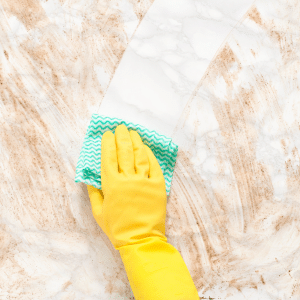How to Remove Countertop Rust Stains in 4 Steps

Between splattering grease, dropping pots, chopping vegetables, and everything else, you need strong and durable countertop materials like natural stone, engineered quartz, and porcelain to ensure the greatest longevity, and with proper care, these surfaces will last for years. One type of damage you might not be terribly familiar with, however, is rust stains.
What should you do if you end up with these unsightly stains in your kitchen? You need to learn how to remove countertop rust stains the right way, depending on the type of surface you’re dealing with.
What Is Rust?
If you think back to your science classes, you might remember that rust is a chemical reaction that occurs when iron is exposed to moisture and oxygen. While you might not have a lot of iron in your kitchen, you probably have plenty of steel, which is an alloy consisting primarily of iron, carbon, and manganese.
Although steel is resilient, making it an ideal choice for pots, pans, cutlery, and more, it can rust if left exposed to water. Suppose that you wash and rinse steel utensils and set them on the counter, or you accidentally leave a steel pot in a puddle of water.
While it will take time for rust to form, you may accidentally hasten by introducing an acidic substance, such as lemon juice. Whatever the circumstances, the result could be corrosion of the metal surface that results in reddish rust stains on your counter surface.
This might not seem like a major problem if you have a darker counter surface, like the black marble in this transitional kitchen, but if you’re dealing with lighter materials, a rust stain could really stand out. Understanding how to address such staining can help you to avoid further damage.

1. Warm, Soapy Water
In some cases, figuring out how to remove countertop rust stains could be as easy as practicing your normal cleaning routine. Whether your counters are natural stone, quartz, or porcelain, a good place to start is with gentle soap and water.
Simply add dish soap to warm water and use a soft cloth or sponge to scrub at the stain. If you get to it quickly and the staining is subtle, this could be enough to remove it. What you’ll want to avoid, regardless of the surface, is resorting to harsh or abrasive cleansers or cleaning tools (like scrubbing pads or steel wool), as these can cause scratching, etching, and further damage.
2. Stronger Cleaning Agents
What if dish soap and water isn’t enough, and rust stains remain visible on your white, marble-look porcelain countertops, like the ones in this contemporary kitchen? The next step is to move to a stronger cleanser, but one that’s still suitable for your type of counter surface.
For engineered quartz or porcelain countertops, you could try applying an all-purpose cleaner with a sponge or soft cloth. If this doesn’t work, move on to a soft liquid cleanser like Bar Keepers Friend, which is very mildly abrasive but diluted by liquid.
None of these products are recommended for natural stone, but you can try a cleanser specifically made for marble and other stone surfaces. Some of these sprays also contain agents that help preserve the stone’s sealant.
3. Apply a Poultice
If stubborn rust stains refuse to budge and you’re starting to worry that you may never remove them from a concrete-look quartz counter like the one in this modern, transitional kitchen, the next thing to try is a poultice or paste. However, you’ll want to use different recipes for different counter surfaces.
For natural stone or quartz, you’ll use a mixture of baking soda with just enough water to form a thick paste. Apply it to the stain, let it sit for a minimum of 15 minutes, and then wipe it away with a sponge or soft cloth. Repeat as needed. For tough stains, you may want to leave the poultice overnight.
As for porcelain, you can create a poultice with equal parts cream of tartar and a 3% hydrogen peroxide solution. This can be left for up to two hours before removing it with a damp cloth.
4. Refinishing
If all else fails and your attempts to learn how to remove countertop rust stains on your own aren’t working, you may want to speak with a counter specialist about refinishing the surface to eliminate the stain. This should be your last resort, as every other option will be less costly.
Call in the Experts
For residents of Rye, NY, and Bethel, CT, tackling countertop rust stains is easier with expert advice from Academy Marble. Whether you’re looking for safe, effective cleaning products or personalized stone care recommendations, our team is here to help you keep your countertops pristine. Contact us today for local, professional guidance on maintaining and protecting your stone surfaces.
The experienced professionals at Academy Marble can help when you visit one of our showrooms in Bethel, CT, or Rye, NY, today.


